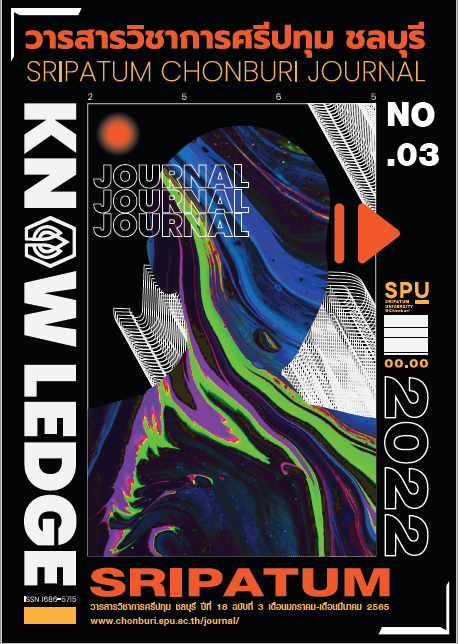QUOTIENT POTENTIAL DEVELOPMENT OF THE YOUTHS BY ANAPANASATI IN BUDDHISM
Keywords:
potential development, quotient, Anapanasati, BuddhismAbstract
The objectives of this research were: 1) to study the development of quotient potential of the youths, 2) to study the principles of Anapanasati in Buddhism, 3) to integrate the development of quotient potential of the youths with Anapanasati in Buddhism, and 4) to propose guidelines in building new knowledge regarding “the Model of integrating Quotient Potential Development of the Youths by Anapanasati.” The data of this documentary qualitative research were collected from academic works, the Tipittaka, Commentaries, and in-depth interviews with 12 experts. The results of the study indicated that:
- The development of quotient potential of the youths consisted of developing in Moral Quotient (MQ) and Adversity Quotient (AQ).
- Anapanasati in Buddhism referred to concentration on mindful breathing to calm the mind for phenomenon consideration.
- Integrating the Quotient Potential development of the youths with Anapanasati principles in Buddhism was to allow the youths to practice anapanasati until their minds were calm enough. Then the Moral Quotient (MQ) on honesty, discipline and kindness and Adversity Quotient (AQ) on self-control, responsibility for problems, situation assessment and how to respond to problems were taught to them. Finally, they consider advantages and disadvantages of problems based on Anapanasati principles. The youths do it continuously under the supervision and guidelines of adults.
4. The guidelines and body of knowledge about integrating the Quotient Potential development of the youths with Anapanasati principles in Buddhism could be summarized into a “TDRAMA Model”.
References
ข่าว 8. (2560). กรมสุขภาพจิตชี้เด็กไทยมี “ไอคิว-อีคิว” ไม่พอ ต้องมี “เอ็มคิว” ด้วย (ออนไลน์). เข้าถึงได้จาก: https://www.thaich8.com/news_detail/37060
, 15 ธันวาคม].
ธีรศักดิ์ กำบรรณารักษ์. (2551). AQ พลังแห่งความสำเร็จ (พิมพ์ครั้งที่ 3). กรุงเทพฯ: บิสคิต.
ประสบความสำเร็จ. (2561). วิทยาศาสตร์เผย “ทำสมาธิติดต่อกัน 8 สัปดาห์” ช่วยพัฒนาสมองให้ดีกว่าเดิม (ออนไลน์). เข้าถึงได้จาก:
https://sumrej.com/change-your-brain-for-the-better-3-2018/[2563, 15 กันยายน].
พัชรินทร์ จิตต์มั่น. (2551). การศึกษาความฉลาดทางจริยธรรมและเจตคติอาชีพอิสระของนักศึกษา คณะเทคโนโลยีคหกรรมศาสตร์ มหาวิทยาลัยเทคโนโลยีราชมงคล
กรุงเทพ (พื้นที่พระนครใต้). กรุงเทพฯ: คณะเทคโนโลยีคหกรรมศาสตร์ มหาวิทยาลัยเทคโนโลยีราชมงคลกรุงเทพ (พื้นที่พระนครใต้).
มหาจุฬาลงกรณราชวิทยาลัย. (2539). พระไตรปิฎกภาษาไทยฉบับมหาจุฬาลงกรณราชวิทยาลัย. กรุงเทพฯ: มหาจุฬาลงกรณราชวิทยาลัย.
วิจารณ์ พานิช. (2555). วิถีสร้างการเรียนรู้เพื่อศิษย์ในศตวรรษที่ 21. กรุงเทพฯ: มูลนิธิสดศรี-สฤษดิ์วงศ์.
วิชชุดา ฐิติโชครัตนา และพระสมุห์วัลลภ วลฺลโภ (เจสระ). (2563). รูปแบบการพัฒนาความฉลาดในการเผชิญและฟันฝ่าอุปสรรคตามแนวพุทธจิตวิทยาของนักเรียน
มัธยมปีที่ 3 โรงเรียนชุมชนวัดไทรม้า จังหวัดนนทบุรี. วารสารสังคมศาสตร์และมานุษยวิทยาเชิงพุทธ, 5(6), หน้า 46-57.
วิทยา นาควัชระ. (2545). เลี้ยงลูกให้เก่ง ดี มีสุข (IQ EQ MQ AQ). กรุงเทพฯ: อัมรินทร์พริ้นติ้งแอนด์พับลิชชิ่ง.
วิรัช ตฤณขจี. (2560). รายงานการวิจัย: ศึกษาวิเคราะห์การเข้าฌานตามแนวอานาปานสติในคัมภีร์วิสุทธิมรรค. กรุงเทพฯ: มหาวิทยาลัยจุฬาลงกรณราชวิทยาลัย.
สมเด็จพระญาณสังวร สมเด็จพระสังฆราชสกลมหาสังฆปริณายก. (2558). ธรรมะประดับใจ. กรุงเทพฯ: โรงพิมพ์สุรวัฒน์.
สมเด็จพระพุทธโฆษาจารย์ (ป.อ. ปยุตโต). (2544). พุทธธรรม (ฉบับเดิม). กรุงเทพฯ: วัดญาณเวศกวัน.
สุริยเดว ทรีปาตี. (2563). การพัฒนาศักยภาพวัยรุ่นและเยาวชนด้วยพลังบวก (ออนไลน์). เข้าถึงได้จาก: http://www2.nrct.go.th/Portals/0/data/07-
part1/07part2/07part3/โดย%20รศ.นพ.สุริยเดว%20ทรีปาตี.pdf [2563, 26 มกราคม].
Downloads
Published
Issue
Section
License

This work is licensed under a Creative Commons Attribution-NonCommercial-NoDerivatives 4.0 International License.
บทความทุกบทความเป็นลิขสิทธิ์ของวารสารวิชาการศรีปทุม ชลบุรี



